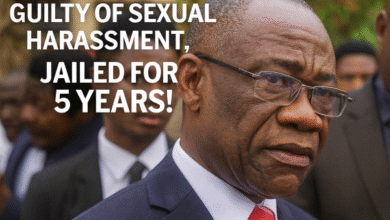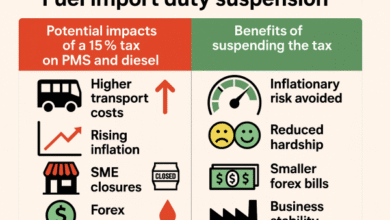PERSPECTIVES FROM ABROAD: As Boko Haram slaughters students, where is Nigeria’s Army?
By Heather Murdock
Witnesses say Nigerian security forces left the area before students were killed by militant anti-education Boko Haram members on Tuesday, and only returned after the rampage.
Another heinous slaughter by Boko Haram, this time of 40 to 60 young male students, underscores how insecure and fraught daily life has become in northern Nigeria – despite an Army crackdown on the shadowy radicals launched nine months ago.
On Tuesday at 2 a.m., in a familiar pattern of early morning raids, the radicals set fire to a boarding school in Yobe State and killed students aged 10-16 as they tried to escape. Other students perished in the blaze, according to teachers, some of whom escaped into the bush.
 For Umar Mamudo, a school administrator in Yobe, it was a devastating reminder of the threat the rebels pose. A phone call from a friend, telling him that “It has happened again,” echoed one seven months back, after gunmen stormed his own school, killing 42 people.
For Umar Mamudo, a school administrator in Yobe, it was a devastating reminder of the threat the rebels pose. A phone call from a friend, telling him that “It has happened again,” echoed one seven months back, after gunmen stormed his own school, killing 42 people.
Mamudo learned that dozens of boys were slaughtered in Buni Yagi, a remote town in Yobe. He rushed to the hospital near Buni Yagi and saw about 50 bodies, some of whom had been “slaughtered like rams,” he said.
With the Nigerian military accounting for the largest single budget item in West Africa‘s largest nation, why the Army is so incapable of protecting people has become a raging question bringing tension and great disappointment.
“Insecurity in Nigeria has continued almost unabated,” says University of Abuja lecturer Abubakar Umar Kari, who attributes the military ineffectiveness partly to corruption. “In the past three years, defense has been grabbing the greatest amount in terms of appropriation and there is very little to show for it.”
Since the state of emergency announced by President Goodluck Jonathan last spring, Boko Haram, whose name means “Western education is sinful,” has launched an escalating series of raids and indiscriminate slaughters at schools, along roads, in mosques, at churches, and at communication centers. Of late, it’s been attacking entire towns in the north.
Mr. Jonathan on Wednesday reached out to the families of the victims, saying he was “deeply saddened” and promised to eradicate terrorism not just with force, but with education and economic opportunities. “We recognize that the root cause of militancy, terrorism, and insurgency is not the strength of extremist ideas, but corrupted values and ignorance,” he says.
Tuesdays’ attack was the fourth on a school in the past year, according to Abdulahi Bego, a spokesperson for Yobe State Governor Ibrahim Gaidam.
Despite nine months of emergency rule in Yobe and two other northeastern states, he said, Nigeria’s insurgency by an Islamist radical offshoot is growing more deadly, and tensions between the federal and state governments are fierce.
“The governor is not happy,” he said. “[The military] needs to change tactics.”
‘WHAT IS THE GOVERNMENT DOING?’
Mamudo witnessed grieving families collecting their sons at the hospital. Other bodies lay unclaimed, as they were boarding in the school far from home. Watching the scene made him furious.
“What is the government doing to protect our lives or the lives of our children?” he asks.
Locals said the military left the area before the gunmen stormed the dormitories. Security forces showed up to the remote boarding school hours after the attack, said Mr. Bega, the spokesperson.
Other northeastern governors have echoed the complaints in Yobe. Last week, Gov. Kashim Shettima ofBorno State, where hundreds of people have been killed in the past two months, angered federal officials by saying that insurgents have more weapons and motivation than the Army.
Jonathan shot back sharply, daring the governor to stay in his state house without federal troops for a month.
“If the governor of Borno State feels that the Nigerian armed forces are not useful, he should tell Nigerians,” he said on state TV. “I will pull them out for one month.”
Politicians blame each other for playing into the hands of insurgents. Meanwhile, the Army claims it is beating back Boko Haram and that they are in pursuit of the men that attacked the school Tuesday.
BOKO HARAM’S OUTLOOK
Boko Haram preaches a harsh version of Islamic law, which includes banning all Western education, and it recently claimed responsibility for killing a renowned Muslim cleric critical of the group.
Through YouTube videos, Boko Haram has hailed school attacks and called for the death of teachers. Witnesses said on Tuesday the girls were told to run away, abandon their studies, and get married.
Attacks on schools encourage poor students all over the region to stay home or attend Koranic schools that don’t prepare them for Nigerian colleges, according to Femi Odekunle, a professor of criminology at the University of Abuja.
“Definitely people will think twice about sending their children to school,” Mr. Odekunle says.
In Adamawa, another state under emergency rule, residents say that an attack on one school is a blow to all schools in northeastern Nigeria.
“We are getting scared daily with reports of killings here and there,” said Ibrahim Adamu as he manned his hand-made wooden fruit stand, selling mangoes, watermelons, and bananas. “No one is safe and government feels like they are unconcerned.”
Courtesy: The Christian Science Monitor











